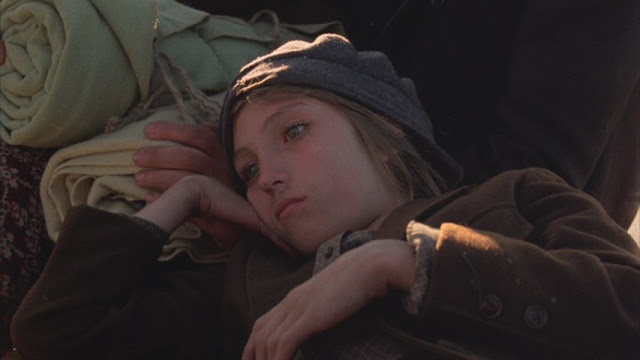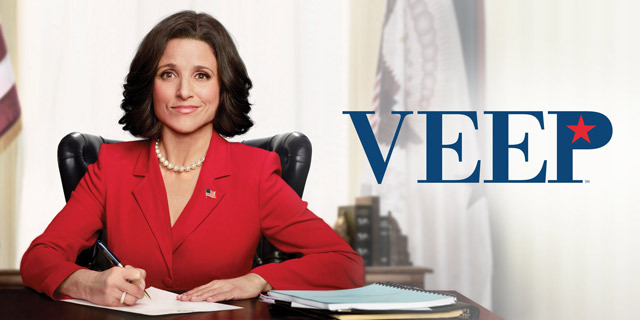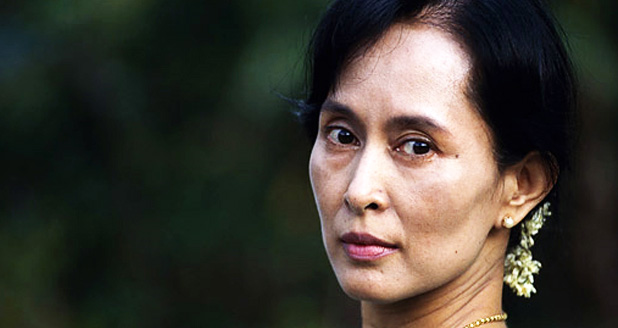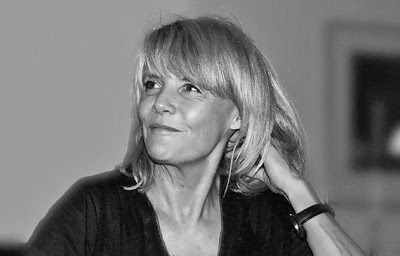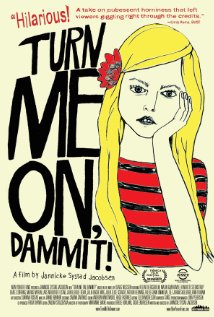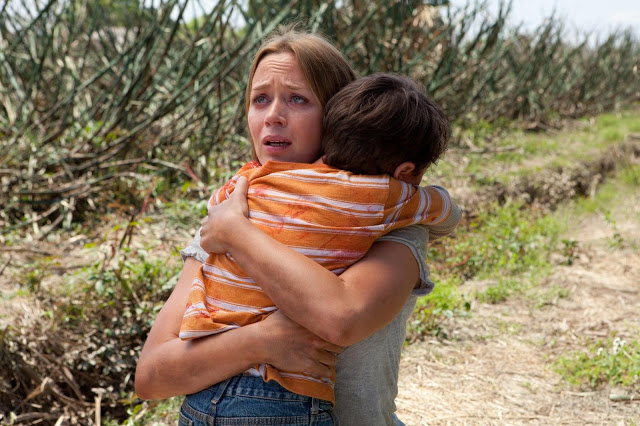New York Times film reviewer A.O. Scott said that 2012 was a year of Hollywood heroine worship, and he lists some fabulous movies with strong and unique female characters.
Tag: Rachel Redfern
Adaptive Female Voices in ‘Days of Heaven’
Written by Rachel Redfern.
Terrence Malick’s 1978 film, Days of Heaven, is considered a film classic well-known for it’s portrayal of the American myth and its spectacular cinematography (though I don’t think I know anyone who’s ever seen it).
The film is typical Terrence Malick, a bit pretentious, with a lack of dialogue and a struggle with continuous narrative, but beautiful and unique at the same time. Set against the poverty of the Great Depression, Richard Gere (Bill) stars as a transient worker in the Texas Panhandle traveling with his girlfriend, Brooke Adams (Abby), and his younger sister Linda Manz (Linda) who is also the narrator. While working at a wheat farm, the dying owner of the farm falls in love with Abby who he believes is also Bill’s sister. Bill encourages Abby to marry the farmer since he’ll be dying soon anyway and they obviously need the money. A love triangle results, bad things happen, fire and death ensues.
There’s the obvious sort of concerns a feminist would have for a film with a plot like this; first, Bill seems to think its fine to pimp out his girlfriend and then get’s angry when she actually falls for the guy. Second, both men fight over her and no one ever seems to ask her what she wants. However, I found the movie surprising because in the end, it’s Linda and Abby who are the driving force of the film and who both show independence as they move forward in life.
The most interesting character in this film though is Bill’s younger sister, a street-wise little girl who’s blunt narrative underscores her own realistic perceptions of the world. Strangely adult, with a rambling, youthful narration style, she accepts the events of her life without too much fuss, offering a sensible, down-too-earth, yet empathetic commentary on the actions of her brother and his girlfriend.
 |
| Linda Manz as Linda in Days of Heaven |
Both of the women are calmly accepting of the events of their life and are highly adaptive. While the whole world is burning around them and they seem to be losing everything, they continue to survive and try to make a new life for themselves wherever they’re thrown. In the end, despite the damage that’s been caused in their name, the two women are hopeful and even excited about their future.
It’s this adaptive nature that I find so compelling in these two protagonists and seems to be a theme I’ve noticed in most female narratives. For example, think of pretty much any movie with single mothers, or Skyler from Breaking Bad, Scarlet O’Hara in Gone With The Wind (not a nice example, but definitely adaptive), Steel Magnolias, Fried Green Tomatoes, The Color Purple, Winter’s Bone, (hell, Ripley in Alien). Each of these female characters is moved about and acted upon and thrown into unexpected situations, yet each manages to thrive. Perhaps in a world where so much has been dictated to them, this adaptive nature of so many women is a natural result.
Gay Rights and Gay Times: Gender Commentary in ‘Husbands’
Like most comedy, the web series Husbands relies on common stereotypes in order to make a humorous social commentary. Husbands is the brainchild of Jane Espenson (Buffy the Vampire Slayer) and Brad Bell, and revolves around the drunken, Las Vegas marriage of two prominent gay men: Cheeks (Brad Bell), who is a well-known TV star, and Brady (Sean Hemoen), a famous baseball player. The two decide to maintain their spur-of-the-moment marriage as a show of solidarity for the gay-rights movement, despite the fact that they’ve only been dating for six weeks; naturally, the two grow more in love by navigating the perilous waters of being newlyweds.
While it’s not the first show to center around a gay couple (Modern Family, The New Normal, Will and Grace), it is one of the first web series to take more of an active role in social criticism, rather than utilizing over-done gay jokes just for comedy’s sake; a fact that makes this show “one notch better” (Nussbaum, The New Yorker) than any of the web series rolling around on the internet.
One of the best things about the series is its firm commitment to exposing the sexual double standards displayed in the media. While it is appropriate to show women in fairly suggestive (and ridiculous) situations, homosexual behavior is seen as far more provocative and inappropriate. During the second season, Cheeks posts a photo online of him kissing Brady, resulting in a ‘billion moms’ uproar over its immoral nature. During the resulting discussions about their situation, the TV in the background features clever commercials of two scantily clad women having a pillow fight and a pretty indecent commercial for pizza.
It’s a great point; despite the fact that it’s absolutely normal for exploitive TV shows and commercials featuring women to be shown, it’s inappropriate for a loving same-gender couple to merely kiss. How is it that the blatant double standard regarding appropriate and inappropriate portrayals of sexuality continues to go unaccounted for by the media and it’s audience?
Husbands discusses this dilemma in season 2 as Cheeks and Brady try to develop an acceptable persona for themselves to show to the world. Are they flamboyant harbingers of social revolution? Or do they quietly operate within society’s rules? One character arguing for each viewpoint, asking the question: what produces results? Loud and proud fights? Or working from the inside in order to produce change? It’s an incredibly relevant and thoughtful argument and one that I was surprised to see during an 8-minute webisode.
This is all a part of the show’s award-winning (Telly Awards) charm; the show is an amped up celebration of astute social criticism and campy marriage sitcom. A combination that embraces its cheesy adorable-ness and smart observations, but a combination you don’t mind since it’s obviously intentional.
The show also features cameo performances from Nathan Fillion (Castle, Firefly), Joss Whedon (creator of Firefly, Buffy the Vampire Slayer), Michael Buckley and other well-known web-series actors. To watch the entire two seasons would take only about an hour, since each season totals no more than a half hour of footage, but make sure to continue watching after the credits (especially in season 2) as that’s when the full footage from their double-standard video expositions is shown.
Unique and snappy (if a bit clichéd in terms of humor) shows like Husbands are wonderfully redemptive examples of positive and intelligent media; the Internet has produced such an amazing opportunity for creative entertainment that isn’t beholden to a corporate studio for their funding. I’m excited to see season 3 and see where Bell and Espensen take the series next, hopefully the show will continue it’s smart gender commentary and continue to expose inequality.
While the show is easily found on Youtube, you can also access the episodes at husbandstheseries, as well as the Husbands comics.
Rachel Redfern has an MA in English literature, where she conducted research on modern American literature and film and its intersection, however she spends most of her time watching HBO shows, traveling, and blogging and reading about feminism.
Women in Politics Week: Political Humor and Humanity in HBO’s ‘VEEP’
Written by Rachel Redfern.
There are two Hollywood versions of Washington, D.C.–one where the president is Morgan Freeman and he’s strong, but compassionate, and you feel good about being an American. The other version is something out of a John Grisham novel in which the city is one giant 60 Minutes expose of cynicism and conspiracy (the latter version just makes you sad to be alive). VEEP is the second, minus the conspiracy and snipers and with the addition of obsessive BlackBerry use.
Since the show never features the president, VEEP is free to focus on the more trivial aspects of federal politics, like the clean jobs bill Selina tries to put together, only to have the president close it down and give her obesity instead (not that obesity isn’t a big issue, it just offers a few more humorous situations than Guantanamo Bay). VEEP is interesting though, not because the characters surrounding her are ridiculous, but because Selina, the main character, is ridiculous and unlikable herself. She’s a toxic political figure, a creator of monumental gaffes and inappropriate situations who doesn’t even have the excuse of good intentions. Her intentions are always self-serving and she treats her staff atrociously, often assigning them the blame for her mistakes.
 |
| Julia Louis-Dreyfus as Selina Meyer in HBO’s VEEP |
Humorously though, her cynical staff decide to turn it into a sympathy moment and try publish a story about in a woman’s magazine. It’s one of many instances when Selina’s stance as the loving, but absent mother plays a role in her political success; It’s only when Selina cries on camera about missing her daughter that her approval rating increases. Comedy shines again as the greater revelator of cultural inequality as Selina’s motherhood is constantly called into question (as is her femininity when she’s given the nickname, “Viagra inhibitor”). As is always the case, a male leader’s relationship with his children is less important than his hairline, but a female leader must always appear guilty and remorseful about her position, she must always regret the fact that her ambition has taken her out of the home or risk being perceived as cold-hearted or worse, un-maternal.
In the end, Selina (and even most of her staff) are undeniably unlikable people. Very little (if any) time of the sitcom is spent showing political figures as doing anything to improve the lives of their constituents; rather their days are filled with scheming and backbiting. Despite the fact that the characters aren’t people you would ever want to meet, the show does highlight the selfish and elitist world of the Unites States’ highest political people, and it’s a nice change to have that shown with a female lead.
Aside from the very astute commentary that the show makes about gender and politics, one of it’s greatest strengths is in the area of the gaffe. Oh the political gaffe: Romney and his 47 percent, Akin and his “women have a way to shut that whole thing down,” Vice-President Joe Biden about half the time. While all we see is the unbelievably stupid thing that a public figure has just said on national television, VEEP does an excellent job of leading up to Selina’s gaffes. They give us the background story and the same information that Selina is given so that when the gaffe does occur it’s incredibly funny, but also a bit understandable. It’s an element of the show that serves as a great reminder of the humanity of our politicians; while yes they say stupid things sometimes, we probably would too if we were in their shoes. I mean, I say stupid stuff all the time, I’m just lucky enough that there aren’t any TV cameras around when I say it. At the end of the day, politicians are just people with better hair.
Rachel Redfern has an MA in English literature, where she conducted research on modern American literature and film and its intersection, however she spends most of her time watching HBO shows, traveling, and blogging and reading about feminism.
A Review and An Interview: ‘Aung San Suu Kyi: Lady of No Fear’
It’s entirely coincidental that my interview with Anne Gyrithe Bonne will be published during the same week that United States President, Barack Obama, will be in Myanmar. While Myanmar’s current leadership has released many of their political prisoners, Myanmar still struggles with human rights violations. The President of Myanmar, Thein Sein, has promised to review all of the current political prisoners and seek their release by the end of the year. Hopefully President Obama’s visit to Myanmar can spur more changes and continue to encourage their transition to a stable and safe country.
The admirable Aung San Suu Kyi, ever mindful of the hard road towards peace, has warned against too early an acceptance of the government’s words, cautioning against their possible motive of appeasement and fearful that the country could slip back into military control with, ‘the mirage of success’ in front of them. Aung San Suu Kyi’s great strength and personal sacrifice in her fight against the government is ongoing and complete, features that are simply displayed in Bonne’s film.
Aung San Suu Kyi: Lady of No Fear naturally covers Aung San Suu Kyi’s infamous periods of house arrest and the personal discipline and mental fortitude she possessed which allowed her to be such a powerful leader and democratic activist. However, the film focuses on Aung San Suu Kyi’s private life, which Bonne would argue is essential to understanding her involvement in the Burmese struggle for democracy. Bonne specifically chose to focus on the astounding relationship between Aung San Suu Kyi and her husband, Michael Aris, since Aris was a major support to Aung San Suu Kyi and similarly held her belief that Burma was everything: more than each other, more than their children.
 |
| Aung San Suu Kyi |
What the film does especially well at demonstrating is the incredible mythic power that Aung San Suu Kyi has over the Burmese people. Because of her background as the daughter of the great commander and soldier of independence, Aung San, as well as her renowned public speaking abilities, Aung San Suu Kyi was able to step into her father’s shoes; as one loyal Burmese supporter said of her, “She is not only a fighter, she is a commander.”
I asked Bonne what she felt that Aung San Suu Kyi had given to women of the world, particularly those involved with the issue of human rights and she suggested something very simple: “rebelliousness.” Without this rebelliousness, a rebelliousness founded in the exemplary cause of civil rights and human freedoms, hierarchies cannot fall and ongoing cycles of violence and abuse and repression cannot be removed. One of the most stunning moments of the film came during a clip of an interview Aung San Suu Kyi had given some years ago. In the interview she’s asked about the situation of her communications with the outside world. While she was given permission to write letters to her family, they were all censored by the government; so, incredibly, she refused to send any more letters because she didn’t want to, “communicate through the authorities.” Even completely isolated from her family she refused to give in to the demands of tyranny and authority.
There is a second side to her though; her graceful and poised nature set her apart from other would-be leaders, and even from her college friends. Aung San Suu Kyi was educated at Oxford during the sixties and while other women were exploring the sexual revolution, Aung San Suu Kyi protested that she wanted to be a virgin when she married and that for now she would, “just hug her pillow at night.” In many ways Aung San Suu Kyi never forgot that she was from Burma, even refusing British citizenship as a way to maintain her heritage, for, as she told Michael when they married, “If Burma needs me, I will go.”
This dual-nature she possesses highlights her relationship to Burma: Burma was always her home, but neither was she the government’s puppet, sporting a rebellious streak of her own. A rebellious streak that Bonne believes is demonstrated in her marriage to Michael Aris, who despite his cosmopolitan upbringing, was still an “enemy of Burma” as an Englishman. Aung San Suu Kyi directly went against her mothers wishes, her family’s wishes, and even the wishes of her country by marrying the man she loved: her mother refused to even attend the wedding.
For many years Aung San Suu Kyi stayed in Oxford with her family, giving birth to two children and supporting her husband’s rising career as a Buddhist scholar, a topic that surprisingly Michael actually taught Aung San Suu Kyi about and an interest that the two of them shared. Eventually, Aung San Suu Kyi began to start her own projects, beginning a biography about her father and even applying to graduate school. However, the sudden failing health of her mother in 1988 called her back to Burma, unknowing that she would become its most outspoken and inspiring democratic activist in just a few short months.
In reference to Aung San Suu Kyi’s sudden propulsion into Burmese politics Bonne felt that Aung San Suu Kyi had been seduced by Burma, stating that, “She had been a proper housewife for a long time, ‘ironing Michael’s socks.’ During that time period the world was more about the man; if you wanted to get a Ph.D you couldn’t because you had your children and your house and your husband. Then there was the 8-8-88 revolution and she went to Burma to visit her mother and she was finally elevated. She gave a lot of public speeches, speeches with some say 250,000 thousand people, some say even 500,000 people; she was an amazing public speaker and people loved her.”
But her success would lead to great personal sacrifice, a situation that Bonne outlines in her film. While many are aware that Aung San Suu Kyi was held under house arrest for almost 15 years, some might not be aware that she was allowed to leave if she chose: she just wouldn’t be allowed to return. The conditions for her release were dependent upon her willingness to live in exile from Burma, however, despite her desire to see her family (Aris and her children were refused visa’s into Burma starting in 1995) she knew that she could only be effective if she stayed in Burma. And how could she leave Burma knowing that so many others could not? How could she leave knowing that Burmese people were suffering and political prisoners were being abused? She therefore chose separation from her family rather than abandon her people, a decision that led to criticism against Aung San Suu Kyi, some saying that she had ‘abandoned her children:’ A harsh accusation against any mother.
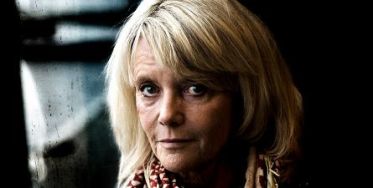 |
| Anne Gyrithe Bonne |
The documentary then walks a delicate line in respectfully baring Aung San Suu Kyi’s unique past, highlighting her political achievements, while also demonstrating Aung San Suu Kyi’s own humanity. In that light, the film focuses more on her personal relationships and features interviews from several of her close friends and family. Interviews that reveal just how much Aung San Suu Kyi sacrificed for the people of Burma after the Burmese government refused to allow Aris to visit his wife, even as he was dying of prostate cancer. Michael died in 1999 in England, unable to say goodbye to his beloved wife.
Despite the tragic circumstances surrounding Aris’s death and the Burmese governments unwillingness to allow him into the country, Bonne believes that Michael’s death served to increase Aung San Suu Kyi’s popularity and power among the Burmese people. When it became known that she had given up everything for them, she became even more beloved and her supporters ever more loyal.
While great attention should obviously be paid to Aung San Suu Kyi’s incredible political triumphs, when asked about what she wanted audiences to take away from the film, Bonne explained that she hopes people see, “That there’s always a story behind the person and then realize what price they had to pay to become that person and who they are.” A tie-in to a beautiful line in the film where Aung San Suu Kyi says, “Nothing is free: if you want something of value you must make payments accordingly.” According to Bonne, Aung San Suu Kyi, “paid a big price.”
The extended version of the film (which I was able to view on Monday night) actually starts at the end of her house arrest, the first few minutes of the film showing footage of Aung San Suu Kyi after her 2010 release. This is unique for many reasons: the documentary was originally released a mere two days before Kyi’s 2010 release. Bonne is humble about this astounding coincidence however, acknowledging that the film certainly, “brought people’s eyes to her.” Obviously the film created a fair amount of exposure about Aung San Suu Kyi’s situation and must have helped to place pressure on the Burmese government. In 2011 the film was selected for the exclusive Berlin ‘Cinema for Peace’ Festival, after which a journalist was finally allowed into Burma to photograph Aung San Suu Kyi.
Bonne’s film exposes Aung San Suu Kyi’s humanity and in so doing has shown the strength and desire for freedom that is possible in leaders and which is fundamentally necessary for the development of human rights in the future. As Aung San Suu Kyi has said, “we must nurture mental strength and support each other,” because it is then that we experience true freedom: “freedom from fear.”
Director Spotlight: Anne Gyrithe Bonne
 |
| Anne Gyrithe Bonne |
Please, ‘Turn Me On, Dammit!’
 |
| Malin Bjorhovde, Helene Bergsholm, Beate Stofring in Turn Me On, Dammit! |
This theme is one that avoids blame and victimization, focusing instead on the human propensity to make stupid (and even cruel or damaging) mistakes and either be a coward about it, or face the consequences. A gender-relevant argument that doesn’t feel aggressive, giving the film a wide appeal to audiences.
Women’s Anger or Women’s Violence in ‘Sons of Anarchy’?
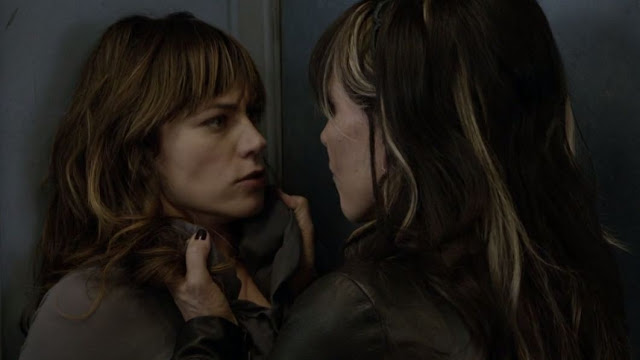 |
| L-R: Tara (Maggie Siff) and Gemma (Katey Sagal) in Sons of Anarchy |
In a recent interview, Mark ‘Boone’ Junior, the actor who plays Bobby in Sons of Anarchy, stated that one of the strengths of the show is that it has, “tapped into a lot of women’s anger.”
It’s an interesting point about a show that does have some very angry women, but more so than that, it has some very violent women. Several times a season there’s a pretty physical fight between a few of the women, and not a standard hair-pulling and a few slaps kind of fight either. Gemma “nails some tart from Nevada” with a skateboard, throws around a very peppy Ashley Tisdale, Gemma and Tara beat up Nero’s assistant Carla, Tara shoots up another girls car, punches her boss, and most recently decks Gemma.
While there is often a sexual fantasy aspect associated with most ‘girl fights,’ I would posit that there is very little sexualizing of the Sons of Anarchy women during these moments, rather these fights seem to mirror the more ‘outside of society’ feeling that the male fights have.
Women’s anger is often portrayed as very catty and manipulative, rarely as physical, so in that respect, Sons of Anarchy is unique. I wonder though, are the physical encounters between these women really expressions of anger, or more a demonstration of women’s own brand of violence?
The Unexpected Portrayal of Motherhood in ‘Looper’
Warning: Spoiler Alert
It seems an obvious sort of review to talk about the unexpectedly large presence of motherhood in Looper, but while I expected to have plenty to say on the movie’s women (or lack thereof) I was not expecting to see motherhood played out in such a diverse way. It’s just not something I expect in a Summer/Fall Hollywood science fiction blockbuster: shame on me for my lack of faith in Hollywood’s creativity.
The first part of Looper is a tangled, intriguing, sometimes gory, exploration of time travel: what happens to your future when we mess with your pass? How do you remember the past if your future doesn’t exist anymore (or vice versa for that matter)? A great question would be, if you chop off a person’s legs in the past, while their future self is in the past, wouldn’t that change their future, even if they’re in the past? Oddly enough, all those questions are answered in the first hour of the film.
But the film really took off for me during the second half, when a different film than the one the trailer promised me, emerged. Cityscapes were traded in for cornfields and discussions on the finer points of temporal displacement are exchanged for character development.
In the second half of the film, Looper did a really great job of showing a few different kinds of mothers starting with Summer Qing (Qing Xu), who plays Bruce Willis’ wife, wants a child, but never gets to have any (explicitly stated in the film). Sara, (Emily Blunt) may or may not have given birth to a seriously creepy, possibly homicidal destructor of the future, and Suzie (Piper Perablo) is a prostitute and exotic dancer who independently raises and supports her young child (and is proud to be able to do so).
Sara’s (Emily Blunt) storyline centers on her incredibly creepy kid, Cid (Pierce Gagnon) who is possibly one of the best child actors I’ve ever seen. Sara’s storyline is unique in that she is a late mother to her son, but despite her fear, and the fact that Cid doesn’t believe she’s really her mother, feels that she must and can save him from a possibly violent future. It’s sort of reminiscent of a Harry Potter plotline—a mother’s love is all that’s needed to make a child grow up “good” and “safe.” The audience is left with the hope that Sara’s belief in her own mothering skills will be enough to stabilize the troubled child and keep him from harming others.
It’s a really sweet sentiment, this “power of love” idea, and to its credit, the film doesn’t specify whether it does heal all ills, but I find this idea sort of problematic. So many parents believe that every mistake their child has made and every bad thing that they’ve done is their fault as a parent. Obviously, this is not always the case. I’m no sociologist and the argument for nature vs. nuture is still swirling around out there, but reinforcing the ideals of a perfect motherhood and it’s redemptive powers seems to be placing too much responsibility on the shoulders of women (without regard for temperament and personality). This is not to devalue motherhood and the great job of raising their children that so many women do, but rather to point out a possibly naïve and damaging ideology that we seem to be indirectly promoting, that if a person were to do something really, really awful (for instance, murder someone) that it would be based on some failure of the parents.
Looper does get credit though for the fact that it does portray a less-than traditional type of mother: Single mom, out on her own on a farm, raising a child she barely knows since her sister raised him first. She was just a woman, doing what she could to be a good mother (though she had some pretty high expectations for herself, and I can say I’d feel a bit of pressure to be the best mother ever if I knew my son would become an evil mob boss and the man I loved had killed himself so I could have a chance to raise him right and stop that from happening). Spoiler Alert by the way.
I bring this up because of an interesting article I read a while ago about children who display characteristics of psychopaths. I feel awful just typing that, but hey, the New York Times said it first. In the article they talk about children who seem to have a neurological condition in the brain centers that control empathy and shame, two essential traits that help to regulate our behavior and response to others. The part I find fascinating is the fact that some children have neurological disorders and that parenting, no matter how wonderful and loving, might not change that. The article quotes a psychologist who, in regard to the possibility of diagnosing the disorder in children, stated:
“‘This isn’t like autism, where the child and parents will find support,’ Edens observes. ‘Even if accurate, it’s a ruinous diagnosis. No one is sympathetic to the mother of a psychopath.’”
Poor Sara with her troubled, possibly evil, child. Nobody feels support for the mother of a psychopath except the psychopath who didn’t have a mother, Joe in this case. Joe mentions his own mother several times in the movie, asking his girlfriend (lover? prostitute?) to rub his hair as his mother did when he was a child (I’ll ignore that possibly Oedipal situation) and telling Cid that his own mother sold him to the gangs. Joe obviously sees himself in Cid, particularly the scenes where he projects into Cid’s future, riding the train alone, hurt and scared, resenting his mother and others for abandoning him and then eventually taking it out on everybody else by becoming homicidal (Jon does kill for a living, it’s not like he’s particularly well-adjusted himself).
The scene seemed a bit fallacious, in terms of it’s logical progression, as I said, loss of a mother should not indicate future murderer. However, I did appreciate the sub-idea that Cid, despite his known future, is not predetermined, perhaps he can change and learn to control himself, and therefore obviously deserves to live.
The movie’s dark beginnings really ended in a very hopeful, life-affirming place, even though it begins and ends with the loss of life.
Rachel Redfern has an MA in English literature, where she conducted research on modern American literature and film and it’s intersection, however she spends most of her time watching HBO shows, traveling, and blogging and reading about feminism.
Female Sexuality in Polley’s Disappointing ‘Take This Waltz’
**Cross posted from Not Another Wave
Rachel Redfern has an MA in English literature, where she conducted research on modern American literature and film and it’s intersection, however she spends most of her time watching HBO shows, traveling, and blogging and reading about feminism.
Seeking the Alpha in ‘Breaking Bad’ and ‘Sons of Anarchy’
**I’m assuming that the people who are reading this article, have caught up pretty far into both of these shows, so some spoilers are present.
Breaking Bad
High school chemist turned god-like meth creator. Walter White’s (Bryan Cranston) journey from quiet grading to bloody drug kingpin is engrossing and incredibly well done. May I also say, that “Yo, bitch” and “Yo, Mr. White” have officially become standard in my vocabulary and I root daily for Jesse (Aaron Paul) to be a winner.
Sons of Anarchy
Sons of Anarchy follows the misadventures of the original chapter of a motorcycle club in Central California, the Sons of Anarchy. Sons of Anarchy are an obvious reference to Hells Angel’s (which has been classified as a criminal organization by the US Department of Justice) and likewise the Sons are arms dealers who sell IRA guns to drug lords. The arrangement is more complicated than just some gun runners though, the Sons of Anarchy are a respected organization in their small town of Charming; they own the police and in exchange for their cooperation and silence, protect Charming from drugs and gang violence. The show is further complicated by it’s Hamlet-esque plot line for the young protagonist, Jax (Charles Hunnam), who begins to doubt the Sons actions and wants to move away from arms dealing (although he manages his fair share of brawls, murders and the occasional knife fight).
Being from Northern California, the backdrops and town names are familiar to me, as is the sight of a large group of bikers cruising down a California highway. Even the sights of New Mexico in Breaking Bad seem homelike, with that crisp desert and blue sky. I find it interesting that both shows take place in the West—the home of cowboy justice; the Wild West still holds some draw to us and remains the place where fortunes can be made and men become men.
Anyone would say that Walter White from Breaking Bad is a raging egomaniac trying to become an alpha male (“I’m the one who knocks”) and that the Sons of Anarchy are territorial egomaniacs who seek to maintain their alpha male status. Both groups of men, while able to beat-up various other bad guys with impunity and whose criminal activities just serve to fuel their need to do so, constantly reiterate that their violent activities are necessary for the protection of their families.
Each group uses family and honor as a justification for their own aggressive desires, espousing an almost medieval chivalric code of honor, one where “the family” is paramount, but pride, strength, and respect are the true priorities. This portrayal of such harsh masculinity is one where the only way to reclaim one’s sense of honor and control, is through violence.
The men in each of these shows maintain this violence with constant rationalizations about how they and their protection is needed by the ones they love. Jax puts a man into the hospital with a horrific beating when he discovers that he sold drugs to his ex-wife. Walt kills Tuco and his cousin, up close and personal, because he believes that they might hurt his family. Vigilantism and backdoor deals are treated as the only way to keep their families safe, despite the obvious truth that it’s that very behavior which has brought them to that point.
There is an obvious hierarchy displayed by each group: either you’re smart enough to live outside of the law, or you’re a sheep. These men who embrace a counterculture lifestyle, place themselves, their intellect, even their consciousness at a higher level than those around them, as if they are entitled to live the way that they do because they remain free from it’s taint. Their honor remains intact because their motivation (family, freedom, love) is pure (or so they believe), a fact that places them above common gangsters.
However, the reasons for the justification have to remain pure as well, meaning that gender roles, must be strictly upheld, otherwise, what are they fighting for? Walt resents Skyler’s need to work, only being supportive when she is actually laundering money for him. His sexual dominance towards her increases as well, needing to feel in control of her behavior.
Sons of Anarchy especially uses gender roles with women pushed into two groups, prostitutes to be played with and passed around the men, and the legitimate “Old Ladies” who are the matriarchs. While these women (in particular Gemma and Tara) are afforded great respect, they are still expected to oversee the comfort and maintenance of the families, while also turning a blind eye to any wayward straying of their men.
The women in Sons of Anarchy are complicated and full of their own issues and ideas and even their own unethical and immoral rationalizations. For me, one of the most interesting arcs of the show has been to see the change in Tara, an intelligent doctor who becomes dangerous in her own right when she attacks a hospital administrator who has suspended her. Gemma is likewise fierce, being gun toting, punch throwing, and threatening all on her own.
Skyler and Marie are complicated protagonists as well, and not fully innocent either. Skyler starts to launder money, has Saul on her speed dial, and arranges for Ted Beneke’s intimidation (even finishing the job herself).
Yet, even as these women are somewhat outside of the norm because of their lifestyles, I think that both shows do a great job at featuring women who are varied and interesting, many of who have reclaimed their sexual nature in spite of the way that they are manipulated and treated by the men in their lives (Bitch Flicks contributor Leigh has a great article discussing this trend).
However, those considerations are secondary to this article. Rather, the focus is this question, what does it mean to be an “alpha” among humans? Is that drive still as present as these shows say it is? And, can you be an “alpha” without being a criminal?
Rachel Redfern has an MA in English literature, where she conducted research on modern American literature and film and it’s intersection, however she spends most of her time watching HBO shows, traveling, and blogging and reading about feminism.
Comedic Feminism in ‘3rd Rock from the Sun’
In case you’re unfamiliar with this 90’s show (despite it’s old age, it deserves to be revisited) the series follows the misadventures of four aliens sent to Earth as a human family. Their mission? Learn and discover the ways of humanity and report it all back to the Big Giant Head, the leader of their home world (played by William Shatner). The show was rife with social criticism, as these “aliens” were able to point out hypocrisies that only an outsider could see.
First, Sally: tall, blond, and a soldier. Sally (Kristin Johnston) comes in with contradictions, my favorite kind of character. She’s the security officer and is the toughest, strongest and most militarily inclined of them all. However, her deep and abiding love for shoes is a running joke of the show, although, in spite of her long legs and blond hair (which would make a Barbie weep), her clothing is mainly old pants, army boots and a t-shirt.
Her character serves as the perfect point at which to make some valid criticisms of women in America. For example, her automatic assumption of all housewifely duties, her hatred of them and inability to fulfill them satisfactorily, is one of her constant frustrations. In fact, Tommy (Joseph Gordon Levitt) is the better cook (and florist) and the family is ashamed when they discover this fact. That gender roles must be kept intact is what these aliens have surmised from society and they feel it a rule that must be adhered to absolutely.
In fact, in the very first episode, Sally whines to the leader of their little family, “why do I have to be the female?” To which Lithgow, or Dick, replies, “We drew straws and you lost” the implication of course being, that everywhere in the universe, the females get the fuzzy end of the lollipop.
Sally’s adventures into the mysterious world of women showcases the varied and constant stereotypical ideas about womanhood. For example, Sally’s virginity is a great cause of confusion for her and she’s unsure of the way that she’s supposed to feel about it (she laments once that she is both ashamed and proud of it, but doesn’t understand why). In the episode given above, entitled “Big Angry Virgin,” Sally, in her experimental relationship, feels pressured to change to please the man she’s dating; this man asks her to allow him to be more in control, and when she completely concedes to his every opinion, he get’s frustrated, still feeling thwarted in his desires. Obviously, the moral in the end is that Sally must realize that she’s fine the way that she is, nor does she need to use pressured sex to repair their relationship (stick around after the credits of the episode to listen to her final thoughts on the matter).
Second Mary Albright: brilliant, saucy, sarcastic, sexy. I love this character, the older academic with her famous drunkenness and pettiness. Mary (Jane Curtin) portrays humanity’s goodness and our weaknesses and I loved that a woman plays this role. She’s there to educate the Solomon’s on everything that humans are, showing them the good and the bad and doing it all with no sense of long-suffering. She bitches about everything and makes her feelings known—no Angel on the Hearth here.
In the episode above, she’s shown in the first few weeks of her relationship with Dick (Lithgow) in uncharacteristic silliness, a trait that fades as their relationship progresses (stick around for characteristic Mary goodness in the clips below).
Third, Mrs. Dubcheck: a surprisingly virile and frisky older lady of dubious ethics; she’s the Solomon’s landlady and often regales them with tales of her glorious youth and exploits.
Fourth, Vicky Dubcheck: her younger, perky, white trash daughter (complete with colored bra and cleavage).
There are various other women in the show, including Tommy’s (Gordon Leavitt) girlfriends (one a hippy feminist, the other a prom queen), substantially different girls, although both are filled with angsty puppy-love.
While the show certainly isn’t a perfect example of feminism in Hollywood, the show does have an incredibly ability to understand and expose so many of the imperfections in our gender roles and relations in modern America.
